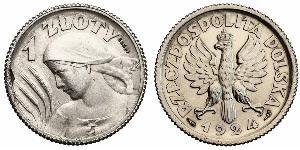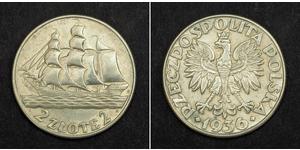5 Zloty Second Polish Republic (1918 - 1939) Silver Józef Piłsudski
1934, Poland (2nd Republic). Silver 5 Zlotych Coin. Jozef Pilsudski / Rifle Corps Eagle!
Condition: XF! Mint Year: 1934 Mint Place: Warsaw Reference: KM-25 (1-Year Type). R! Denomination: 5 Zlotych – Jozef Pilsudski / Rifle Corps Material: Silver (.750) Weight: 10.99gm Diameter: 28mm
Obverse: Uniformed bust of Jozef Pilsudski left. Date (1934) at 4 o’clock near rim.
Reverse: Polish Eagle as on the Polish Rifle Corps hat badge radiant. Legend around, date and denomination below. Legend: RZECZPOSPOLITA POLSKA / 5 ZLOTYCH 5
Jozef Klemens Pilsudski (5 December 1867 – 12 May 1935) was a Polish statesmanâ€â€?Chief of State (1918-22), “First Marshal” (from 1920), and authoritarian leader (1926-35) of the Second Polish Republic. From mid-World War I he had a major influence in Poland’s politics, and was an important figure on the European political scene. He is considered largely responsible for Poland’s regaining its independence in 1918, after 123 years of partitions. Pilsudski successfully annexed Vilnius from Lithuania following Å»eligowski’s Mutiny but was unable to incorporate most of his Lithuanian homeland into the newly resurrected Polish State.
Early in his political career, Pilsudski became a leader of the Polish Socialist Party. Concluding, however, that Poland’s independence would have to be won by force of arms, he created the Polish Legions. In 1914 he anticipated the outbreak of a European war, the Russian Empire’s defeat by the Central Powers, and the Central Powers' defeat by the western powers. When World War I broke out, he and his Legions fought alongside the Austro-Hungarian and German Empires to ensure Russia’s defeat. In 1917, with Russia faring badly in the war, he withdrew his support from the Central Powers.
From November 1918, when Poland regained independence, until 1922, Pilsudski was Poland’s Chief of State. In 1919-21 he commanded Poland’s forces in the Polish-Soviet War. In 1923, with the Polish government dominated by his opponents, particularly the National Democrats, he withdrew from active politics. Three years later, he returned to power with the May 1926 coup d’etat, and became the de facto dictator of Poland. An Italian fascist ambassador to Warsaw described him as “a liberal democrat in the clothes of an old-world knight”. From then until his death in 1935, he concerned himself primarily with military and foreign affairs.
For at least thirty years until his death, Pilsudski pursued, with varying degrees of intensity, two complementary strategies, intended to enhance Poland’s security: “Prometheism”, which aimed at breaking up, successively, Imperial Russia and the Soviet Unioninto their constituent nations; and the creation of an Intermarum federation, comprising Poland and several of her neighbors. Though a number of his political acts remain controversial, Pilsudski’s memory is held in high esteem by his compatriots.
|

-500-250-n8oKbzbiDXIAAAFRm0eWyns1.jpg)
-300-150-7Gh_AAEBxIgAAAElMdxzfAP9.jpg)
-300-150-QYV_AAEBXHUAAAElzqFzfAP9.jpg)
-300-150-uaR_AAEB5AsAAAElQWNzfAP_.jpg)
-300-150-iY1_AAEBEI4AAAElAMtzfAP..jpg)
-300-150-Dk9_AAEBoZQAAAEl3INzfAQA.jpg)













